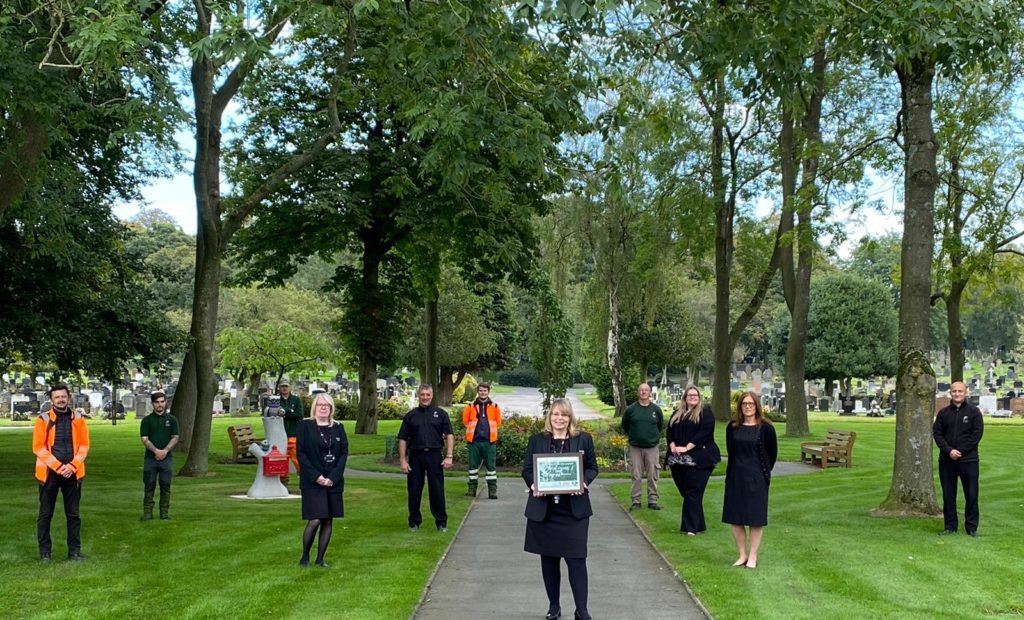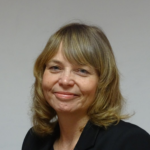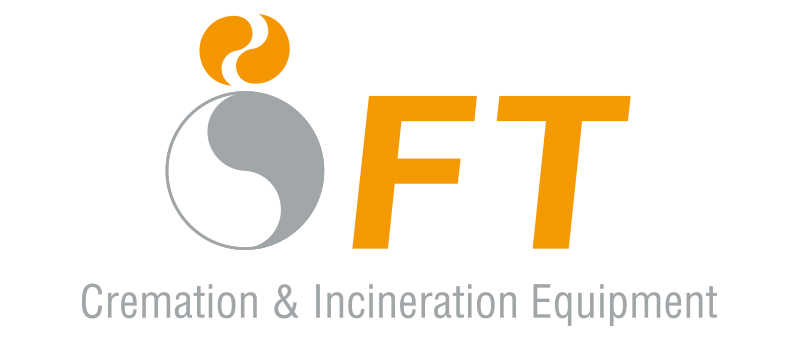2020 has been a tough year for most. Between new regulations and less staff available, many industries struggled with the new guidelines. The funeral sector was not exempt from this. However, just like the rest of the country, crematoria across the UK were dedicated to making sure things ran as smoothly as possible.
We interviewed Sonia Smith of St Helens Crematorium to discuss how they overcame the obstacles put in place by the pandemic and what it means to them to provide quality service despite the current situation.
I work for St Helens Crematorium in Merseyside. My role is the Bereavement Services Manager and I have held this role for the past 16 years.
I manage the Bereavement Services for St Helens Council, we have a small caring team of around 16 people and I find the job very rewarding in the fact that you are constantly helping people at the most difficult time in their lives. Making a difference to help them through the bereavement as best you can.

It’s a really caring and supporting role to the bereaved, I am a people’s person, and you have to have empathy, compassion and care at all times.
It can be a challenging job and at St Helens Crematorium we carry out over 2,400 funerals a year. 2020 to me has been the most challenging in my 35-year career dealing with the challenges the pandemic brought upon us, trying to maintain well being and to stop staff and myself from becoming exhausted. It has been a difficult first wave and very demanding on our profession. At the moment we are preparing for the winter months and the possible second wave.
It’s the simple things that make the difference, like receiving a hand written card from a visitor to the Cemetery to say thank you for the colourful flower beds it made the Cemetery welcoming and bright and helped our visit.
Winning silver in the Cemetery of the year awards, this was a good achievement for my team this year. My team have really worked so hard like many other Bereavement Services teams, but the resilience and determination to get the job done has inspired me.
This year has been a really difficult year with all the restrictions and stripping back on how funerals can take place. It has been so difficult not meeting or engaging with families face-to-face and not being able to carry out the bereavement services as we normally would. It has left a lot of people suffering in silence and it is not good for the bereaved, we have tried to do everything we can to help the communities we serve during this difficult time. Many families will struggle due to this with health and mental health concerns because they could not give their loved one the send-off they feel they deserved.
To the Industry funerals have been more simplified and stripped back this is restrictive to many but some have been able to grieve more simply than feeling the need for a big elaborate send off, which sometimes happens in pre-covid times you give in to peer pressure.
The biggest change is the number of people allowed to attend funeral services due to social distancing and the limits set by government legislation of numbers permitted to attend funerals, families have struggled to limit people attending, many have not been able to grieve as they would have liked to do so. In the early stages of the pandemic and the first wave, churches closed making it not possible for families to have funeral services in churches. This caused distress to some families in the early days one lady waiting over 8 weeks hoping for this to change and it didn’t. Funeral Directors have maintained an appointment system and, on some occasions, not met the bereaved family until the funeral service, making the funeral very impersonal. Our colleagues in the Funeral Industry have suffered in the way they support the bereaved and found it so against everything they do to support the bereaved, all the care and then no touching or hugging or human contact to help them through this. It’s been really difficult for us all to comprehend.
The restrictions of face to face meetings with the bereaved, the lack of not being able to support them in the usual ways with human contact. Most of the contact has been via a phone conversation and you lose the personal touch some of the empathy, you do your best, but it certainly is not the same. With the lack of body language, you feel so frustrated that it is so difficult to support the bereaved in the supportive normal ways.
St Helens Crematorium team adapted really quickly and were very reactive to the needs of the bereaved and we quickly dealt with everything thrown at us. The pace was so fast and it was hard to keep up but everybody did and that’s one thing this industry does very well and it’s been demonstrated so much during 2020. It is the can do and the will do ethos within the teams and, here in St Helens, they recognise that we are all in it together. The looking after each other, and with regular communications with all other parties and colleagues at other Local Authorities in Merseyside and Greater Manchester and with our colleagues in the private sector within Merseyside near to St Helens.
We formed a partnership working together with Greenacres a privately run green burial site based in Rainford and made arrangement to support each other. To me the best thing to come from the pandemic, working with like-minded professionals, Officiants, funeral directors, registrars, coroners, Merseyside resilience forum and our own St Helens Council Resilience team to make quick local decisions, along with the Merseyside Bereavement Team, which was set up during the Covid19 pandemic. All Merseyside Cemeteries and Crematoriums regularly met up to support one and other and develop a consistent approach to death management.
We all worked together for the greater good of the bereaved and did a successful ‘Father’s Day virtual event’, which involved all the media and communications teams. This was a huge success and brought some comfort to our bereaved families.

At St Helens we also introduced a free streaming of the funeral service to help with the restrictions of numbers allowed to attend funerals and worked with our IT department who were so supportive and key in instigating this being a success to date we have streamed over 300 funerals and more the 3,000 people have been able to watch.
We also set up a Covid19 book of condolence to help anyone bereaved in our community. Three members of our team experienced a close bereavement during the pandemic, and it was a difficult time for them.
That we need to develop more best practice for our Profession and strive to be the best we can. It felt like at times we were the unappreciated key workers as no one wants to talk about death.
That the Death care industry has a lot to be proud about. That we need to continue to ensure that the Government listens to us moving forward and supports the Bereavement Care as a profession.
It has taught us to support each other more, look at our well-being more and that its ok to not be ok. We have all felt mentally drained during covid19, and self-care is so important.
We need to be better prepared for the future in case we have more pandemics. It was difficult to train redeployed staff and get on with the front line service, but we did and we need to make sure we have the right amount of resilience and there is some excellent best practice out there.
I am fortunate in Merseyside I have some brilliant support in neighbouring authorities, and we will each continue to support each other in the future. There is a real sense of care and mutual respect to each other.
Continuing to develop our excellent best practice of bereavement services throughout the Country. Our story is not unique; some of the best people you can meet work within this profession. The people really care about people who are bereaved and are all doing their best.
Keep raising the profile of ‘Death’ it is the one sure thing in life along with taxes.
Keep doing community events and open days build on the momentum of the now.
Never has Bereavement Services been more in focus.
The pandemic has united the Industry as a whole and it would be good to keep this momentum going.
More collaborative events and regional events as together we are stronger.
The Crematorium at St Helens is due to embark on a modernisation project in 2021, this was paused due to Covid19 in 2020, the building will be modernised and developed to enhance the services currently available to the bereaved, this is such an exciting time for the borough.
The very active Friends group are also working on a project with the local veteran Community to develop a special area of the Cemetery dedicated to all the soldiers, buried in the Cemetery at St Helens. We are working with them also to launch a digital Tree of Remembrance service in December when this would have been our tenth service this year.
We are also looking at joining this years annual ‘National Grief Awareness Week’ NGAW in December 2020, as this year grief has hit so many families due to the pandemic and the Families need our support more than ever. Last year members of the Bereavement Services Team joined a sponsored walk from Liverpool to Salford Cemetery via St Helens, fundraising for this charity, with other members of the ICCM from the North West Branch.

Sonia Smith is the Crematorium Manager at St Helens Crematorium and you can connect with her here.

Facultatieve Technologies (FT) with 145 years of experience in cremation is the international market leader in the design, construction and maintenance of cremation and filtration equipment.